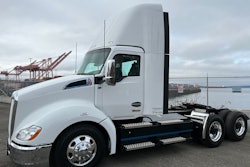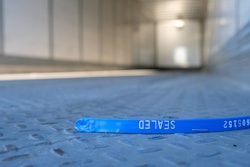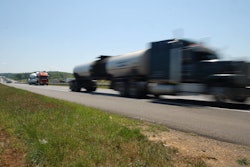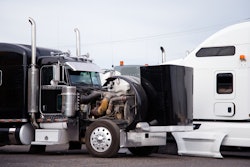Trucking news and briefs for Tuesday, July 16, 2024:
Trump's pick for VP has trucking-friendly legislative record
Former President Donald Trump on Monday tapped Ohio Senator J.D. Vance as his vice presidential running mate.
Vance, currently in his second year as Ohio’s junior senator, was a co-sponsor of S.1034 (the Truck Parking Safety Improvement Act), which calls for the allocation of funds to create safe parking spots for trucks and make necessary improvements to existing truck parking areas, and S.2671 (DRIVE Act), legislation that would prohibit the Federal Motor Carrier Safety Administration (FMCSA) from implementing any rule or regulation mandating large commercial motor vehicles (CMVs) engaged in interstate commerce be equipped with a speed limiting device set to a maximum speed.
[Related: What’s going on with speed limiters and other trucking legislation?]
Vance was elected to the U.S. Senate in 2022 and sworn into office on Jan. 3, 2023. A veteran of the Marine Corps, Vance served in the Iraq War, then graduated from The Ohio State University and Yale Law School. He also wrote a bestselling book, Hillbilly Elegy, which was turned into a Netflix movie.
Ryder to acquire Pit Stop Fleet Service
Ryder System (CCJ Top 250, No. 12) has entered into a definitive agreement to acquire Pit Stop Fleet Service, enabling the expansion and further strengthening of Ryder’s Torque by Ryder retail mobile maintenance business offering, Ryder said.
Based in Venice, Florida, Pit Stop offers retail mobile commercial fleet maintenance, including battery, tire and transmission repairs, preventative maintenance, and breakdown assistance.
The transaction, which Ryder expects to complete by Aug. 1 subject to customary closing conditions, is expected to add approximately $24 million in gross revenue to Ryder’s Torque by Ryder business in 2025 and provide incremental growth to Ryder’s earnings. Financial terms of the deal are not disclosed.
Ryder expects the transaction to create synergies and to benefit both Ryder and Pit Stop customers. To ensure a seamless experience for customers, Ryder will fully integrate Pit Stop employees, assets and operations. Ron and Connie Perry, who co-founded Pit Stop in 1997, will help support the integration into Ryder.
“With our complementary retail mobile maintenance fleet services across diverse industries and markets, we now have even greater economies of scale and offer unparalleled flexibility for fleets requiring swift maintenance services,” said Tom Havens, president of Fleet Management Solutions at Ryder.
With this latest Ryder acquisition, Ryder’s retail mobile maintenance services will be available in 140 markets in 20 states: Alabama, Arkansas, Arizona, Florida, Georgia, Indiana, Kentucky, Louisiana, Maryland, Mississippi, New Jersey, Nevada, New Mexico, North Carolina, Oklahoma, Pennsylvania, South Carolina, Tennessee, Texas, and Virginia; with plans to further expand into additional states later this year.
Since its launch in the summer of 2023 and with this acquisition, Torque by Ryder will have a workforce of about 200 technicians, delivering comprehensive support to customers. This includes a wide range of vehicles serviced, including commercial trucks, trailers, delivery vans, refrigerated vehicles, construction and utility vehicles, passenger and shuttle buses, and emergency response vehicles.
[Related: Ryder debuts new retail mobile maintenance service]
Another petition to strengthen rear underrides denied by NHTSA
For the second time in recent weeks, the National Highway Traffic Safety Administration is denying a petition requesting that the agency include additional requirements in its rear underride regulations.
The petition was submitted Aug. 18, 2022, by Jerry and Marianne Karth, Eric Hein, and Lois Durso-Hawkins. It requested that NHTSA amend Federal Motor Vehicle Safety Standards (FMVSS) No. 223, “Rear impact guards,” and FMVSS No. 224, “Rear impact protection,” to include additional requirements.
A similar petition from Jerry and Marianne Karth, Eric Hein, Lois Durso-Hawkins, Aaron Kiefer, Andy Young, and Garrett Mattos dated July 15, 2022, asked the agency to reconsider its July 15, 2022, final rule adopting requirements similar to Transport Canada’s standard for rear impact guards. NHTSA noted that the petition did not meet the requirements for a petition for reconsideration, so the agency considered it a petition for rulemaking.
Due to similarities between the two petitions, NHTSA responded to both in one Federal Register document published Monday.
[Related: NHTSA denies rear-impact guard reconsideration petition from safety coalition]
In the Aug. 18 petition, the petitioners requested that NHTSA initiate rulemaking to require that rear impact guards on trailers provide protection in 30% overlap crashes at up to 35 mph. They claimed the agency had failed to fulfill Congressional directives by not requiring this standard in the July 2022 rulemaking. The petitioners’ July 15, 2022, petition made essentially the same arguments, NHTSA added.
In denying the petitions, NHTSA said its FMVSS “must be practicable, it must meet the need for motor vehicle safety, and it must be objective, reasonable, and appropriate for the motor vehicle type for which it is prescribed. While a particular trailer model may include a more robust guard as standard, the agency must consider the effect of a mandate on all (emphasis in original) vehicles subject to FMVSS No. 223 and FMVSS No. 224.”
The agency added that an analysis of the costs and weights for currently available trailers led to a conclusion that a 30% overlap condition “would not be reasonable or practicable.”
The petitions were ultimately denied because the petitioners “did not provide new or different information that would warrant initiation of a rulemaking at this time.”
NHTSA’s Advisory Committee on Underride Protection in recent a recent report submitted to the agency recommended stronger rear impact guards, though the merits of the committee’s report have come under fire both from within and outside of the committee.
[Related: Heated debate over recommendations for improving underride guard regulation]
Pitt Ohio launches new next-day lanes from Ohio to New York
Pitt Ohio (CCJ Top 250, No. 51) has launched next-day LTL shipping lanes from Columbus, Cincinnati, and Toledo, Ohio, to Buffalo, New York.
These next-day lanes strengthen the company’s network in the Northeast and provides businesses with a faster and more efficient way to move their goods, the company said.
"We are excited to offer our customers in Ohio a faster and more reliable option for shipping to Buffalo," said Geoff Muessig, Executive Vice President and Chief Marketing Officer at Pitt Ohio. "These new next-day lanes will help businesses reduce transit times, improve inventory management, and ultimately enhance customer satisfaction."
Benore Logistic utilizing renewable diesel at South Carolina terminal
Benore Logistic Systems (CCJ Top 250, No. 152) announced this month a new initiative to advance its sustainability efforts through the delivery of renewable diesel directly to its South Carolina terminal. The initiative is in partnership with Michelin North America and Pilot Travel Centers.
Last month, the collaboration reached a milestone with the successful demonstration of a renewable diesel load at Benore's Pendleton, South Carolina, terminal.
Renewable diesel, a cleaner alternative to traditional petroleum diesel, is derived from renewable resources such as vegetable oils, animal fats, and greases. Its production process significantly reduces greenhouse gas emissions compared to conventional diesel, contributing to cleaner air and a healthier environment.
The inclusion of renewable diesel exemplifies the commitment of Benore, Michelin, and Pilot to environmental stewardship and sustainable business practices, the companies said.
By utilizing renewable diesel exclusively in Benore's Michelin dedicated truck fleet, the companies aim to not only reduce their carbon footprint but also set a new standard for sustainability in the transportation industry.
"We are excited to lead the charge in promoting renewable diesel as a viable and sustainable fuel option," said Jeffery M. Benore, President and CEO at Benore Logistic Systems. "This initiative is a testament to our shared vision with Michelin and Pilot to prioritize environmental responsibility while maintaining operational efficiency."
In addition to promoting renewable diesel, the companies are actively exploring logistics solutions for large-scale distribution and developing strategies to make renewable diesel more accessible to businesses and consumers alike.
[Related: Renewable diesel vs. battery-electric: Which one has lower emissions?]












